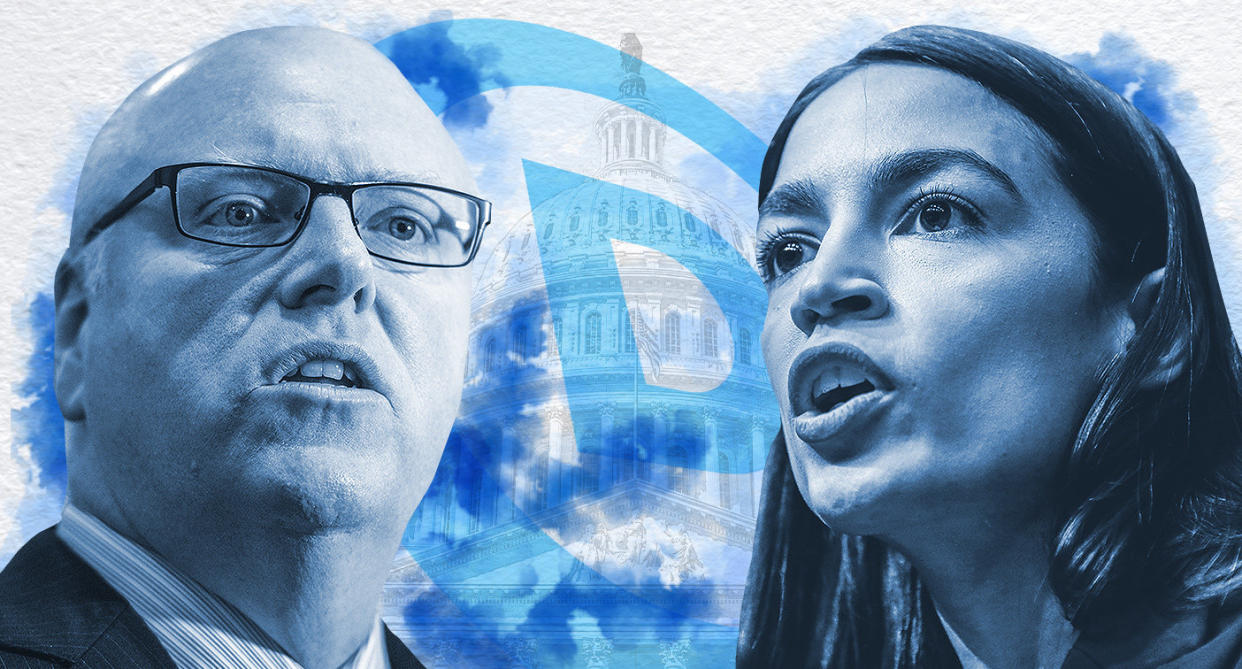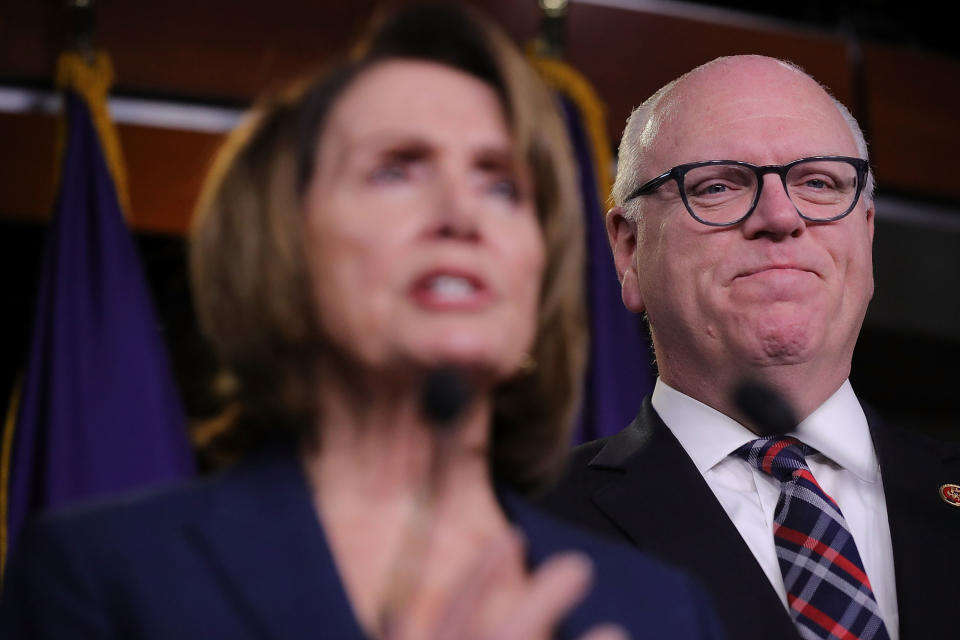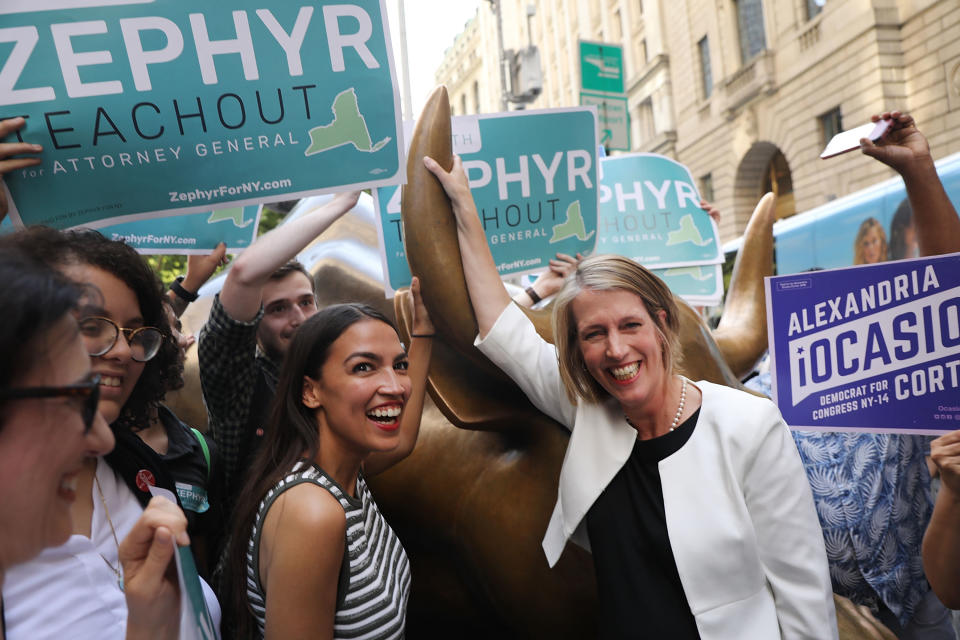The inside story of how AOC defeated the Democratic machine

WASHINGTON — Some congressional seats are safer than Fort Knox, and it just happened to be Joe Crowley’s luck that he had one of these, in the outer New York boroughs of Brooklyn and Queens. A native of Queens, Crowley first won election in New York’s 7th District in 1998, a tribune of lunch-pail Democrats who were central to New York’s legend about itself. Fourteen years later, the district was redrawn to include a slice of the Bronx and rechristened the 14th District. Crowley easily won that too.
By 2016, Joe Crowley was one of the elder statesmen of the national Democratic Party. And though the New York seat gave him no worry, he yearned to ascend ever higher in the party’s power structure in Washington, D.C. Crowley saw his chance in the aftermath of the cataclysm that was the 2016 presidential election. Colleagues grappling with President Trump’s appeal to working class whites pushed him to challenge Nancy Pelosi, the powerful California Democrat slated to become House minority leader of the 115th Congress.
Crowley seriously considered the ramifications of challenging the most powerful Democrat — and woman — in his conference. Nine days after the election, Crowley called Pelosi.
“I wanted to let you know I’m not going to run,” Crowley told her.
“Good decision,” Pelosi answered.

It would be the closest Crowley would ever get to wielding power under Trump. About a year and a half later, he faced something seemingly inconceivable: a primary challenger. Even more inconceivable was the challenger, a 28-year-old bartender from the Bronx. By the time it was all over, Crowley would be seen largely — if not entirely fairly — as a footnote in the ascent of Alexandria Ocasio-Cortez, the Gil Amelio to her Steve Jobs.
The exchange with Pelosi — and Crowley’s downfall to the woman now known as AOC — is relayed in “The Hill to Die On: The Battle for Congress and the Future of Trump’s America,” by Jake Sherman and Anna Palmer, editors with Daniel Lippman of Politico Playbook, the twice-daily distillation of who, and what, matters in Washington. Like the newsletter that has made them famous — at least among those who consider Twitter a form of physical exercise — “The Hill to Die On” is imbued with the conviction that C-SPAN doesn’t show the truly important parts of Congress. Or the fun ones.
In their telling of Crowley’s defeat, Sherman and Palmer either had direct access to Crowley or someone extremely close to the former congressman (likely the former, given the detailed recounting of at least one spousal conversation). As such, they provide a useful and engaging account of one of the biggest upsets of the 2018 midterms. It is history told from the defeated’s perspective.
Sherman and Palmer describe Crowley as the almost too-perfect embodiment of everything Ocasio-Cortez was running against. They write it “was an open secret that Crowley lived with his family in suburban Virginia, not in Queens.” A leader of that borough’s Democratic Party, he practiced the backslapping politics that were increasingly the stuff of a bygone New York, where political clubs on dusty outer-borough stretches held in ordinate sway. “He played guitar and was often seen at parties with a beer in hand,” Sherman and Palmer write, gently noting that Crowley was not “a policy wonk.”

Crowley did not answer Yahoo News’ requests for comment.
He was, however, an exceptional fundraiser for fellow Democrats running for Congress. There is no goodwill in Washington quite like the goodwill that comes from having your coffers filled, and Crowley — who maintained hopes of a leadership position despite having declined to challenge Pelosi in 2016 — was happy to help stuff dollars into pockets that were not his own. On March 1, 2018, on the very cusp of the midterm primary season, Crowley held a fundraiser at the Wythe Hotel in Brooklyn, a sleek symbol of the new Brooklyn where rooms went for well over $300 a night. Twelve Democrats running for the U.S. House showed up. Ever the good soldier, Crowley managed to raise $900,000 on their behalf. A time would come, probably after the 2018 midterm elections, when they would surely have the opportunity to pay Joe back.
Two months later, there was a seemingly inconsequential item in the Queens Chronicle: “Ocasio-Cortez on the ballot in NY-14,” the headline read, noting that she had gained the requisite signatures to challenge Crowley in the primary. Actually, she managed about four times what the city’s Board of Elections required. Still, the Queens Chronicle was not impressed. “Crowley expects easy primary win,” a second headline said, with the article itself arguing that “massive hurdles” would likely prevent Ocasio-Cortez from the “stunning upset” she had in mind.
Crowley agreed. As Sherman and Palmer write, he was so “focused on his campaign inside the Capitol and on helping other Democratic candidates,” he failed to see the threat materializing on the other side of the Triborough Bridge. (A spokeswoman for Rep. Ocasio-Cortez declined to make her available for an interview for this article.)
Sherman and Palmer report that even as the Acela-bound press corps largely ignored Ocasio-Cortez, Crowley’s own polling showed what they euphemistically call “troubling results.” One poll, in early 2018, showed that “his name ID was low despite being in office for nearly 20 years.” A second poll showed Crowley with an illusory 36-point lead, illusory because it surveyed only “super-prime voters,” older outer-borough whites loyal to the Democratic machine. Those were not the voters Ocasio-Cortez was after. In the 14th District’s disillusioned young, its black and brown working classes, she saw a voting bloc that had been all but invisible to Crowley.
The authors also fault Crowley’s campaign advisers for their seemingly disengaged approach to his primary challenger. “Crowley had plenty of fodder he could’ve used against Ocasio-Cortez, but his top New York campaign operatives decided to take the punches and not hit back.” That sure sounds like Crowley casting blame.
He probably knew that he was caught in a trap, so ensconced in Washingtonian struggles that he couldn’t be seen tending to the lowly Bronx. “It wasn’t just that Crowley didn’t want to go dirty; he thought it would be a sign of weakness in D.C. if he was seen in a tight race against Ocasio-Cortez,” Sherman and Palmer explain. “He was supposed to be the next Democratic leader, not someone who had to fight to re-election.”
Yes, well, and Hillary Clinton was supposed to win Wisconsin. In her only debate with Crowley, Ocasio-Cortez treated Crowley more or less the way Trump had treated his Republican challengers three years before. “If a person loves their community they would choose to raise their family here,” she said of Crowley’s choice to live on the Potomac River, not the East River. “They would choose to send their kids to our schools, they would choose to drink our water and breathe our air.”
Crowley continued to hold out hope that the “Ocasio-Cortez shoestring campaign was going to show its weakness on Election Day,” as Sherman and Palmer put it, “and his institutional support would drown her.” But as New York’s 14th went to the polls, Ocasio-Cortez supporters showed up en masse. She beat Crowley by 15 points.
“The seemingly invincible Queens party boss had gone down,” Sherman and Palmer wrote, describing how Crowley dedicated a rendition of “Born to Run,” the Bruce Springsteen ode, to the woman who defeated him. Then he called his son Cullen, who was entering the U.S. Naval Academy in Annapolis, Md., the following morning.

At some point during the night, Crowley also took a call from Pelosi, whom Sherman and Palmer describe as “distraught.” They do not say what she was distraught about. Pelosi’s representatives would not confirm that the call took place. But since resuming the House Speaker’s gavel, Pelosi has struggled to contain the emboldened progressive wing of the Democratic Party, an insurgency of which Ocasio-Cortez is the undisputed leader.
As for Crowley, Sherman and Palmer describe him ushered out of the House with roughly the same emotion as that which followed Stalin on his final journey across the Soviet Union. One has to wonder how much of that was the fear of older Democrats now worried that they too would have to fend off a progressive primary challenger like Ocasio-Cortez.
Not that Crowley went all that far. A little more than a month after Ocasio-Cortez took his former seat in the House, Crowley joined Squire Patton Boggs, an immensely influential Washington lobbying firm that paid its top influence peddlers well over a quarter million dollars.
And he continued the good-old-boy fundraising back home — or “home” — in Queens. In February, the New York Post reported that Crowley was charging up tp $250 a head for a St. Patrick’s Day party at the Globe Tavern in the borough’s traditionally Irish neighborhood of Sunnyside. The goal was to raise money for a new state-level political action group, “Joe for New York.” The unflattering Post report, with its swampy stench, scuttled those plans, and Crowley announced that partygoers could pay what they wished. He said there had been some confusion. And maybe there was, on Crowley’s behalf. He must have thought he was still in Washington.
_____
Read more from Yahoo News:



